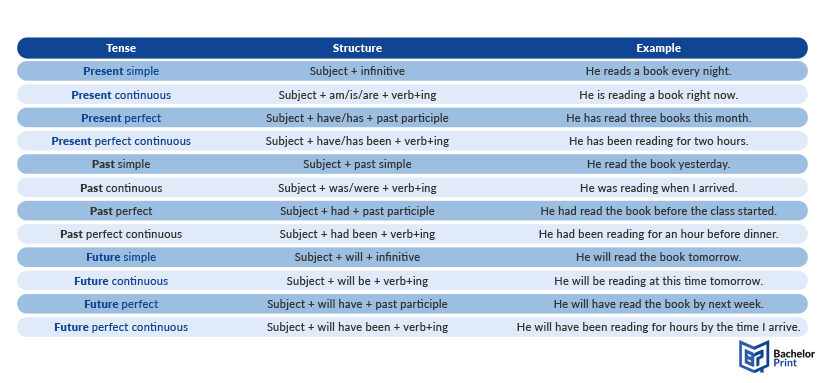
Adherence to the correct tenses is essential in academic writing, directly impacting its conciseness, clarity, and readability. At times, deciding on the appropriate tense could be relatively perplexing, entailing a careful application of language rules. Yet, the situation is not as complex as it may initially seem. As indicated by Cambridge University Press, the majority of students will only need a handful of tenses to express their ideas effectively, once they grasp the associated language rules.
Definition: Tenses
Tenses are grammatical constructs that express the time at which an action or event takes place. In English, verb tenses are used to indicate whether an action occurs in the past, present, or future. They also convey additional information about the action, such as whether it is ongoing, completed, or habitual. As mentioned before, they can be divided into three main categories, which each have four aspects or subcategories: simple, continuous (also known as progressive), perfect, and perfect continuous. These subdivisions allow for a nuanced expression of time and aspect, which enables both speakers and writers to convey the exact nature of an action.
The 12 tenses
There are a total of 12 time forms in English, each conveying details about the time and nature of the action. In this section, we will introduce you to all types and subtypes of tenses by dividing them into past, simple, and future. After this, we’ll provide you with a downloadable PDF document, that encompasses all time forms.
The present
The English language has four subcategories for the main category “present.” Each one will be explained below, along with numerous examples and how to form them.
Present simple, or simple present, is used to describe everyday actions and general truths. It’s the most basic of the English tenses for English learners, as it is often formed with just the root verb and no additions. The only mistake one can make, is to forget the suffix “-s,” “-es,” or “-ies,” which is added to the verb when the subject is in third-person singular.
- If the verb ends in –o, -ch, -sh, -ss, or -x, you add “-es.”
- If the verb ends in a consonant and -y, you drop the -y and add “-ies.”
Structure
Subject + infinitive (+ “s,” “es,” or “ies” for 3rd person singular)
Examples
Present continuous, or present progressive, describes actions that are happening right now or around the current time. For this tense, auxiliary verbs are needed.
- For singular first-person pronouns, you use “am.”
- For third-person personal pronouns, you use “is.”
- For plural personal pronouns, you use “are.”
Structure
Subject + am/is/are + verb+ing
Examples
Present perfect is used to describe actions that were completed at some point before now, often with relevance to the present. It is formed with the auxiliary verbs have/has and the past participle of the verb, which is the second past form. More information can be found in our article on present perfect, which includes common temporal adverbs used with this tense, and our article on verb conjugation. More specifically, present perfect is used to describe actions that:
- are ongoing, but started in the past
- were completed very recently
- were completed multiple times before and are likely to be completed again
Structure
Subject + have/has + past participle
Examples
Present perfect continuous, or present perfect progressive, describes actions that started in the past and are still ongoing or have recently stopped. It is often used to emphasize the duration of the activity. It is formed by using the auxiliary verb have/has, been, and the -ing form of the verb.
Structure
Subject + have/has been + verb+ing
Examples
The past
The English language has four subcategories for the main category “past.” Each category will be explained, as well as several example sentences and how to form them.
Past simple, or simple past, is used to describe actions that were completed at a specific time in the past. When it comes to this tense, there are two types of verbs: regular verbs and irregular verbs. How to form them can be found in our detailed article on the past simple tense, as well as many exercises and a helpful PDF document encompassing them all for a quick overview.
Structure
Subject + past simple form
Examples
The past continuous, or past progressive, is commonly used to describe actions that were in progress and were completed at a specific time in the past. It is formed with the helping verb was/were and the -ing form of the verb.
Structure
Subject + was/were + verb+ing
Examples
Past perfect is used to describe actions that were completed before another action in the past occurred. It is formed with the helping verb “had” and the past participle form of the verb.
Structure
Subject + had + past participle
Examples
The past perfect continuous, or past perfect progressive, is used to describe actions that were ongoing in the past until another past action occurred. The different between this tense and the past perfect tense is that the former was ongoing, while the past perfect tense was a one-time occurrence. The past perfect continuous is formed with the auxiliary verb “had” and “been”, along with the -ing form of the verb.
Structure
Subject + had been + verb+ing
Examples
The future
In English, there are four subcategories for the main category “future.” Each one will be explained, as well as numerous example sentences and how they’re formed.
Future simple, or simple future, is used to describe actions that will happen at a specific time in the future. It is formed by using the modal verb “will” (or the modal verb “shall,” which is more formal and less commonly used with first-person pronouns) before the infinitive of the verb. If the action will happen in the near future, you can also use the present continuous tense instead.
While “shall” is less commonly used in modern English, it can often be seen in formal or legal writing, as it is used to make polite offers or suggestions and conveys a stronger sense of resiliency or inevitability. The difference between this tense and the “going to” future is explained in our future simple article.
Structure
Subject + will + infinitive
Examples
Future continuous, or future progressive, is used to describe actions that will be ongoing at a specific time in the future. It is formed by using the helping verbs “will/shall” with “be” and the -ing form of the verb. It is often used to show more certainty than the future simple tense.
Structure
Subject + will be + verb+ing
Examples
Future perfect is used to describe actions that will be completed before a specific future time. It is formed with “will have” and the past participle of the verb.
Structure
Subject + will have + past participle
Examples
Future perfect continuous, or future perfect progressive, is used to describe actions that will be ongoing until a specific future time. Although it’s a rare occurrence in everyday life, this tense is used to emphasize the duration.
Structure
Subject + will have been + verb+ing
Examples

Below, we have created a PDF document that encompasses the information above along with exercises.
Conditionals
Conditionals are grammatical sentence structures used to discuss possible or hypothetical situations and their consequences. They are important for tenses because they rely on specific verb forms to indicate when the condition and its result take place. The four types of conditionals will be explained below along with examples.
Zero conditional
The zero conditional is used for general truths or scientific facts where the result is always true if the condition is met.
Structure
If + present simple, present simple
First conditional
The first conditional is used for real and possible situations in the future.
Structure
If + present simple, will + infinitive
Second conditional
The second conditional is used for hypothetical or unlikely situations in the present or future.
Structure
If + past simple, would + infinitive
Third conditional
The third conditional is used for hypothetical situations in the past that did not happen.
Structure
If + past perfect, would have + past participle
| Conditional | Example |
| Zero conditional | If it rains, the ground gets wet. |
| First conditional | If she studies hard, she will pass the exam. |
| Second conditional | If I won the lottery, I would travel the world. |
| Third conditional | If they had left earlier, they would have caught the train. |
Common tenses in academic writing
Three tenses are most commonly used in academic writing: present simple, past simple, and present perfect. The following paragraph introduces the functions and includes numerous examples for each one.
The present simple
Often considered to be the most common tense, the present simple serves several functions:
- To emphasize the primary focus of the article.
- To reinforce what is presently known about a topic.
- To make general observations and statements.
- To reference previous papers as well as current tables and figures.
The past simple
Let us now examine when the past simple can be used as well as some examples:
- Reporting findings from a previous study where the author is named.
- Discuss what methods and/or data were utilized.
- Highlighting the results of ongoing research.
- Emphasizing that an event occurred in the past.
The present perfect
Let’s finally discuss the present perfect tense, as well as when it is most often used.
- When introducing new subjects.
- Generally summarizing what has already taken place.
- Citing prior findings without mentioning other authors.
- Making connections between the past and the present.
Printing Your Thesis With BachelorPrint
- High-quality bindings with customizable embossing
- 3D live preview to check your work before ordering
- Free express delivery
Configure your binding now!
Tenses in a research paper
A research paper consists of various sections, such as the abstract or methodology, and each of these sections necessitates a distinct tense. The following sections state and explain which tense is used in which component.
Abstract
Most experts agree that the present simple tense is best utilized within the abstract. This is a clear way to state facts and highlight the subsequent results.
Introduction
Introductions are used to provide further information that is believed to be true. Thus, both present perfect and present simple tense should be used.
Theoretical framework
Theoretical frameworks are intended to reinforce an existing theory and why the issue in question exists. Therefore, the majority of the information should be addressed with present simple or present perfect.
Methodology & results
The methodology of the study and the results will always occur before a conclusion is reached. Therefore, it is best to employ the past simple tense. This tense ensures clarity when discussing completed actions.
Conclusion
A combination of past and present tense verbs can be used when presenting a conclusion (depending upon what is being discussed).
Literature review
Literature reviews often use the past simple tense to explain previous findings, highlighting what has been discovered in the past.
FAQs
Three verb tenses represent the lion’s share of those utilized within an academic paper. The most common tenses are:
- Present simple
- Past simple
- Past perfect
The 12 tense forms are: present simple, present continuous, present perfect, present perfect continuous, past simple, past continuous, past perfect, past perfect continuous, future simple, future continuous, future perfect, and future perfect continuous.
The three main types are: present, past, and future.
Examples
Simple present: She goes to college every week.
Simple past: She went to college last week.
Simple future: She will go to college next week.
